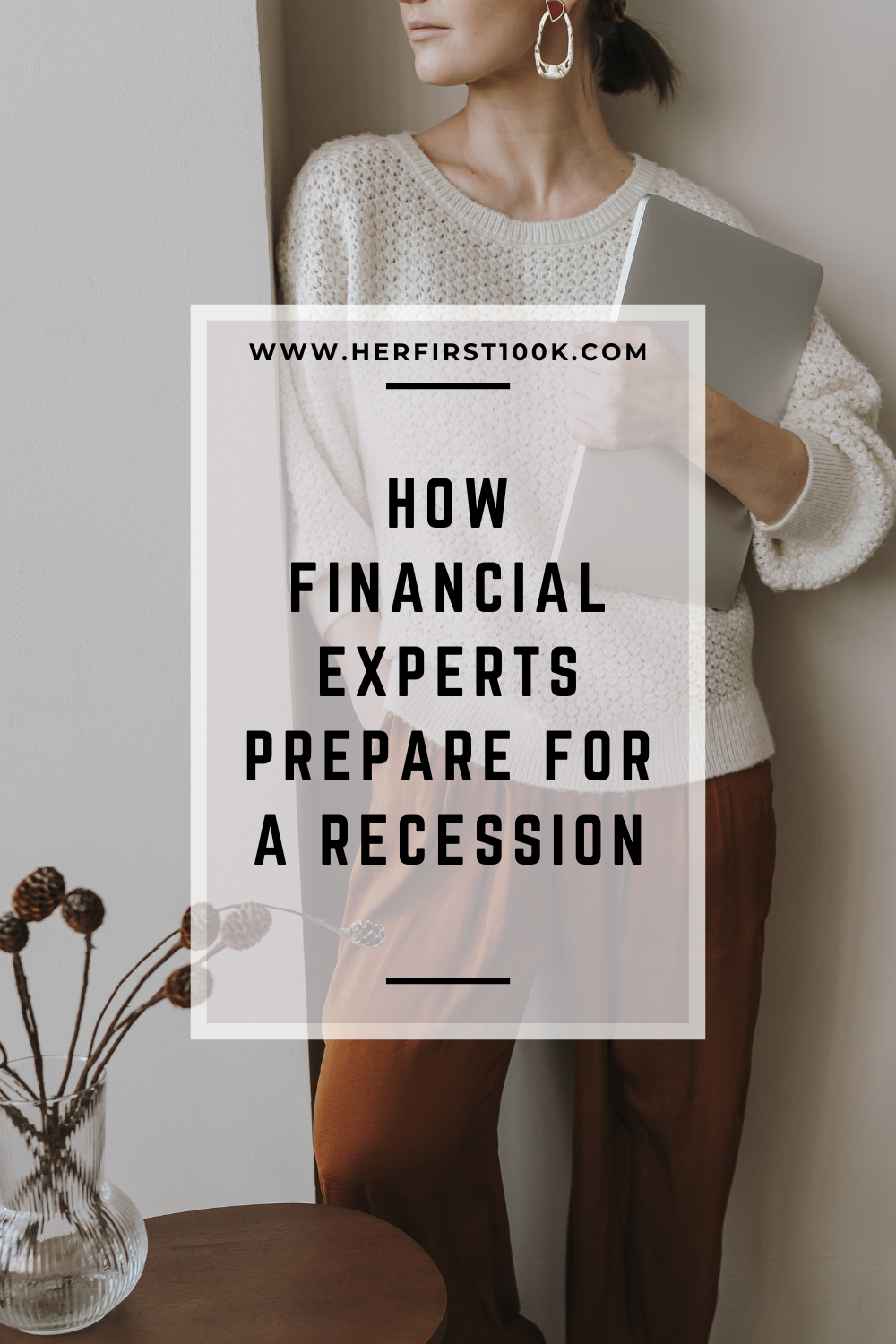The following article may contain affiliate links or sponsored content. This doesn’t cost you anything, and shopping or using our affiliate partners is a way to support our mission. I will never work with a brand or showcase a product that I don’t personally use or believe in.
How to Prepare for a Recession Like a Financial Expert
It’s the word on everyone’s lips and minds: recession.
You want to be prepared–but where tf should you start? And how do you even begin to prepare for a recession in a way that actually makes a difference, rather than just shooting in the dark?
I’m sharing my plan and including insights from a couple of my favorite trusted financial creators on how you can prepare for a recession like a financial expert.
But first…what even is a recession? How will it affect your finances?
Before we jump into the expert tips (don’t worry, they’re coming!), let’s talk a little bit about what a recession really is and how it will affect you.
According to Investopedia, a recession is defined as “a significant, widespread, and prolonged downturn in economic activity.”
Now, that doesn’t mean that we are in a recession every time the economy takes a bit of a hit. The key here is that this is a prolonged downturn – usually meaning that it will last six months or more.
So what causes a recession? Well, you know how, in a chain of dominoes, once one domino falls it knocks over the next one, which then knocks over the next one, and so on and so forth? This is exactly what happens in a recession: one (or usually multiple) factors knock down one “domino” which then puts our economy on a [somewhat unavoidable] track towards a recession.
The recession domino effect looks something like this:
-
Something causes a decline in the economy
-
Other factors make the decline in the economy worse
-
The stock market begins to suffer
-
Companies prepare for a recession
-
Consumer spending decreases dramatically
Once there is a certain amount of momentum, this chain of events is hard to stop.
Are we in a recession right now?
If you’re thinking “holy f*ck that sounds awful,” you’re not wrong. But despite what the clickbaity headlines are telling you, we are not currently in a recession…yet.
So while we are feeling some of the early pain points of a recession (like stock market dips), it’s important to note that we aren’t in a full-fledged recession just yet.
This is great news because it means that we still have time to make appropriate adjustments to our lifestyles and finances so that we can be as prepared as possible for a prolonged season of economic downturn.
How to prepare for a recession like a financial expert
In addition to my own thoughts, my team reached out to some of our favorite financial creators to ask how they personally recommend preparing for a recession like a money expert. Here’s what they each had to say.
My Tip #1: Pad your emergency fund
“The first thing I need you to do is check in and make adjustments to your emergency fund. If you have followed HFK for a while then you know I recommend having at least 3 months of essential expenses saved in an emergency fund, but now is the time to really bulk that up. Not only will this give you more wiggle room and time in the case of an emergency (like unexpectedly losing a job), but it will also keep your emergency fund relevant to today’s rate of inflation. If you put 3 months of expenses in your emergency fund five years ago, that same amount of money might not reflect three months of living expenses now due to inflation.”
My Tip #2: Make sure your emergency fund is in a HYSA
“While we are talking about emergency funds, make sure that yours is in a high-yield savings account so it’s not just earning like 0.08% in interest. Putting your emergency fund in a HYSA will allow that money to earn as much interest as possible and will make that money work harder for you, even while it’s just sitting there.”
Click here to check out my recommended HYSA!
My Tip #3: Revise your budget
“Next, make sure your current budget is appropriate for our current market and rate of inflation. The same $30 you used to fill up your tank of gas is not going to go as far as it did two years ago, so if you haven’t updated your budget in a bit, you may need to make adjustments.
While you’re taking a close look at your budget, I also want you to look for areas where you can cut unnecessary spending. Subscriptions are a great place to start, as chances are there are probably a couple that you don’t actively use or don’t need right now.
Finally, use this opportunity to identify your ‘non-essential’ areas of spending like dining out, getting your nails done, going to the movies, etc. I don’t want you to have to cut these as they are often those areas of spending that bring you joy and a sense of financial fulfillment, but they are important to identify so that – in the case of an emergency – you will quickly know where you can cut costs if necessary.”
My Tip #4: Continue investing if you can afford to
“Finally, I really want you to continue proactively investing if you can afford to. I know that when people hear the word ‘recession’ they often automatically think ‘stock market crash’, but a recession can actually be a great time to invest if you have a long-term investing plan!
Think of investing during a recession like going shopping during a major sale – many companies will be selling shares at a much lower price than normal which will allow you to maximize your return when the market improves.
If you’re nervous about losing money in the stock market during a recession, just remember that studies show that if you hold your shares for a one year period (even during a recession), your odds of making money on your investment is 68%. If you hold them for 10 years, those odds go up to 88%. 20 years? Your odds increase to 100%. I’d say that’s worth it.
If you want more of this kind of practical, easy to understand, scare-tactic-free information about investing, then you need to join my investing platform, Stock Market School! I created the comprehensive investing education platform for women so that you can confidently learn about the stock market, create an investing plan for the long-term, and navigate investing with ease, expert support, and encouragement from a community of like-minded investors.
Jannese Torres
Jannese is the creator and host of the award-winning personal finance podcast, Yo Quiero Dinero, and is one of my favorite financial experts and creators!
Jannese’s Tip #1: Prioritize paying off high-interest rate debt
One of the ways that the Federal Reserve is trying to slow the rate of inflation is by raising interest rates. This essentially makes it more expensive to borrow money which is meant to encourage people to stop spending.
Jannese writes, “The biggest impact for most will be the price of variable interest rate debt, AKA credit card debt. A larger chunk of your payment will go towards interest as the rates increase, so if you’ve been neglecting paying them off, now is the time to put that payoff plan into overdrive. As they say, time is money, and it’s definitely going to cost you.”
Jannese’s Tip #2: Brush up your resume
One very unfortunate result of a recession is an increase in layoffs across the country. Even if you feel extremely secure in your employment, it can’t hurt to be prepared for the worst.
Jannese says, “If it’s been a while since you’ve applied for work and your resume hasn’t been updated in the last 12 months, now is a good time for a resume refresh. Make sure to include your latest role and experience, expand your network via LinkedIn, and keep an eye out for industry layoffs on message boards like TheLayoff.com and Layoff.FYI.”
Bola Sokunbi
Bola is the founder of Clever Girl Finance and is passionate about helping women take control of their money so they can live life on their own terms.
Bola’s Tip: Diversify your income
Another way to handle employment insecurity is by having multiple streams of income – that way if one source of income suddenly disappears, there are still other sources of income to fall back on.
Bola shared on her blog, “The average millionaire has 7 sources of income! Is there something you’re passionate about doing? Something you do that you get complimented on all the time? Consider turning it into a side hustle to generate some additional income.”
It is important to keep in mind that you should only take on a side hustle if you have the mental and physical energy and time available to do so. We don’t want you to stretch yourself to the point of burnout.
Sticking to the plan
I know that preparing for a recession can feel overwhelming and scary, but these tips will not only help you survive and thrive, but will also help you kickstart your journey to 100k, through the highs and lows of the economy.







